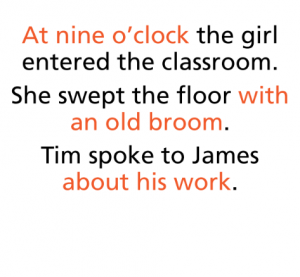What is an adverbial?

Even if you do not know what adverbials – or adverbial phrases – are, you are using them constantly in conversation.
Adverbs and adverbials are similar but not the same. An adverbial is one word (an adverb) or a group of words (called an adverbial phrase) that give more information about the sentence or the VERB.
Adverbials, adverbs, and verbs
Thus, the adverbial phrase is a group of related words which play the role of an adverb. You will see that adverbials are used OPTIONALLY. In other words, the sentence can stand alone without the adverbial. Like all phrases, an adverbial phrase does not include a subject and a verb.
- I visited San Francisco today. (normal adverb)
- I visited San Francisco one morning last week. (adverbial phrase)
Based on the definition that adverbials give more information, the different types of adverb can be recognized by the kind of question that is being answered in the adverbial
- Manner/degree adverbials ( happily, willingly, quickly, very) –answers the question HOW something happens or is done
- Time-based/frequency adverbials (usually, later, today, when, as soon as possible, recently) answers the question WHEN OR HOW OFTEN something happens
- Spatial/place adverbials (here, north, up, across, in Boston) – WHERE something happens
- Probability/intensifying adverbials (certainly, barely, sort of, additionally, perhaps) –Answers the question HOW CERTAIN WE ARE OF SOMETHING
- Modal adverbials answers the question – HOW DO YOU FEEL ABOUT THIS? (perhaps, maybe, fortunately, hopefully)
- Emphasis/textual adverbials (lastly, finally, angrily) – answers the question HOW MUCH OR HOW LITTLE?
HOW:
For an adverbial of degree or manner, we can place it in front of the main verb or at the end of the sentence.
He quietly opened the door.
Many adverbials of manner are formed from adjectives by adding –ly
i.e. last – lastly; sad – sadly; study – studiously
She did that so easily.Sometimes the adjective is the same as the adverbial
She works hard.
WHEN:
Time-based/frequency adverbials describe when something happened, duration and frequency:
A dog barked during the night.
The have been married since 2004.
We always swim in winter.We often use a noun phrase as a time adverbial:
Yesterday, last week, last Saturday, the other day.
WHERE:
Spatial adverbials tell us something about the location, direction, distance.
I did a lot of sight-seeing in Boston
I traveled a long way
HOW CERTAIN ARE WE
– is when we use adverbials of probability Perhaps the weather will be fine.
Maybe it won’t rain.
Other adverbs of probability usually come in front of the main verb:
He is certainly coming to the party.
Modal adverbials are answering the question HOW DO YOU FEEL ABOUT THIS?
Hopefully, I will be able to attend.
HOW MUCH OR HOW LITTLE?
Textual adverbials used to alter or intensify the meanings of adjectives and other adverbs are also known as intensifiers
I think it’s incredibly funny.















